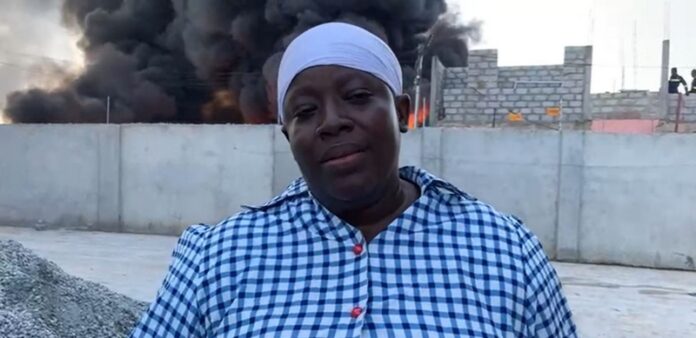The manager of Charkieh Plastics and Packaging Limited, a pioneering recycling and manufacturing facility at Weija Junction, has expressed deep disappointment following the massive industrial fire that ravaged the factory in the early hours of Saturday, November 22.
The blaze, which required deployment from seven fire stations to bring under control, decimated the entire facility—obliterating infrastructure built over four decades and destroying specialised machinery critical to Ghana’s circular economy.
Speaking to JoyNews, Factory Manager Gloria Amenu struggled to articulate the scale of financial and human devastation, stressing that the loss goes far beyond monetary value because of the company’s long history and commitment to its workers.

An Era Ends: Loss of a 40-Year Legacy
Charkieh Plastics was not merely a business; it was a long-standing institution within the local manufacturing ecosystem, specialising in the reprocessing of waste plastics.
Ms Amenu emphasised the company’s deep roots and longstanding dedication to its employees and community.
“It’s not easy at all for us because this is a factory that we’ve built up almost 40 years ago. And then we have workers who have worked here for as long as 33 years. And we were the first factory to have a ‘24-hour economy’ 10 years ago,” she recounted.
The factory was among the first in the region to adopt a 24-hour operational system, marking it as a high-output industrial hub and significant employer. The longevity of its staff—with some serving for more than three decades—underscored a sense of permanence that has now been abruptly shattered.
Millions in Equipment Destroyed: The ‘Beyond Imagination’ Cost
A major component of the financial loss stems from the destruction of the facility’s core processing equipment.
Charkieh Plastics relied on advanced industrial machinery to wash, disinfect and recycle waste plastics before they were transported to Jamestown for final processing into finished products.
Ms Amenu confirmed the destruction of critical units: “It’s beyond imagination because this is a factory that we have almost six washing machines and two recycling machines.”
These machines were essential for the initial stages of the recycling chain: “And our machines also wash and disinfect the plastics before we take them to James Town, where we manufacture almost 300 units.”
Destroyed Assets:
• 6 industrial washing machines
• 2 industrial recycling machines
(Total: 8 major units lost)
Production Halt:
• An estimated daily output of about 300 finished units from the Jamestown assembly point is now completely halted.
Replacement Costs:
• The replacement of high-capacity recycling and washing lines is expected to run into hundreds of thousands of dollars or several million Ghana cedis—an amount Ms Amenu said she could not bring herself to quantify.
“I can’t state when you can buy it. It’s a very heartbreaking situation,” she said.
Social Crisis: Job and Accommodation Losses
The fire is also expected to trigger a deep social and employment crisis for the hundreds of workers whose livelihoods depend on the factory.
Ms Amenu noted that the impact extends beyond the loss of jobs, as the company also provided accommodation for many long-term staff.
“We have a lot of workers working with us. So you can see the impact, the effect that it’s going to have,” she said.
She added, “We have a place for the workers to sleep,” indicating that some employees have now lost both their income and their homes.
The dual tragedy leaves many long-serving workers displaced and vulnerable, presenting an immediate humanitarian challenge in the aftermath of the disaster.
ALSO READ:
Seven fire tenders battle huge fire outbreak at Weija Junction
Semenyo remains our player – Bournemouth coach addresses transfer speculation



